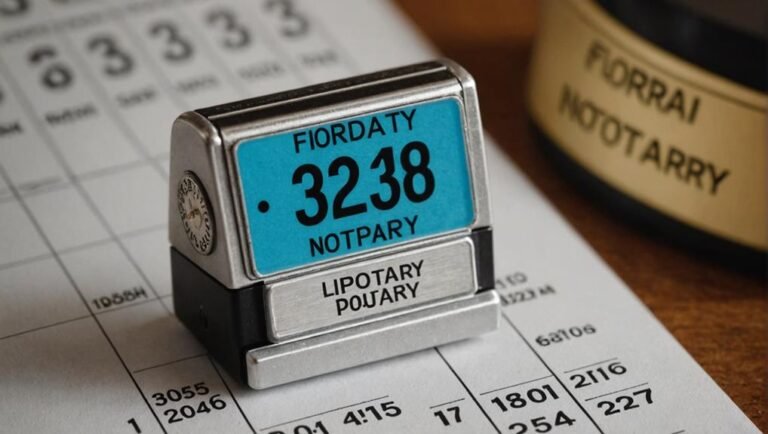Certain offenses like theft, fraud, drug crimes, and firearm violations can disqualify you from being a notary in Florida. Legal non-compliance, including child support issues and court mandates, may also prevent you from becoming a notary. Additionally, crimes involving death, great bodily harm, or deceit are disqualifying factors. Make sure to review the state-specific criteria, such as felonies related to dishonesty, fraud, or violence, before pursuing a notary commission in Florida. Understanding the impact of criminal convictions and denial factors based on your criminal history is important.
Key Takeaways
- Certain felonies related to dishonesty, fraud, deceit, or violence disqualify applicants.
- Background checks and fingerprinting are mandatory for all notary applicants in Florida.
- Good moral character must be demonstrated to become a notary in Florida.
- Meeting citizenship restoration criteria is essential for becoming a notary in Florida.
- Non-compliance with legal obligations like child support orders can lead to disqualification.
Criminal History
When considering eligibility for a notary commission in Florida, individuals must be aware that a criminal history, particularly involving theft offenses, fraudulent activities, drug-related crimes, firearm violations, and a range of disqualifying offenses, can render them ineligible for this role.
The Department of State's Notary Division in Florida places significant emphasis on the integrity and trustworthiness of notaries, hence a conviction of a felony or certain crimes can disqualify an individual from holding this position.
Theft offenses such as grand theft, petty theft, burglary, and robbery are serious disqualifying factors. Involvement in fraudulent activities related to death, impersonation of a peace officer, or financial fraud can also hinder one's ability to become a notary.
Drug-related crimes, including possession or sale of controlled substances, and firearm violations like carrying a loaded firearm or using a weapon threateningly, are additional grounds for disqualification. Maintaining a clean criminal record free of disqualifying offenses is essential for those aspiring to become notaries in Florida.
Legal Obligations
Adherence to legal obligations is imperative for individuals aspiring to become notaries in Florida, as failing to meet requirements such as child support orders or court mandates can result in disqualification.
Non-payment or non-compliance with child support orders, as well as resisting or not following court orders, may serve as disqualifying factors for notary eligibility in the state. It's essential for individuals seeking to become notaries in Florida to fulfill their legal obligations promptly and completely.
Failure to meet legal obligations, including child support or court mandates, can hinder someone from becoming a notary in Florida. The state places significant importance on upholding court orders and meeting all legal responsibilities.
Hence, individuals must make sure they're compliant with child support orders and court mandates to maintain eligibility as a notary public in Florida. By fulfilling these legal obligations, aspiring notaries can demonstrate their commitment to upholding the law and serving with integrity in their role.
Disqualifying Factors
Meeting certain disqualifying factors can prevent individuals from becoming a notary in Florida. One of the primary disqualifying factors is the presence of criminal offenses on your record. Certain crimes like theft, fraud, drug-related offenses, and firearm violations can hinder your eligibility for a notary commission in Florida. Additionally, failure to meet legal obligations such as child support payments or court orders can also be grounds for disqualification. Crimes involving death or great bodily injury, offenses related to Medicare, real estate tax, welfare, and insurance are also significant barriers to obtaining a notary commission in Florida. It is crucial to be aware of these disqualifying factors, as they can impact your ability to serve as a notary public in the state.
| Disqualifying Factors | Examples of Offenses | Impact on Notary Eligibility |
|---|---|---|
| Criminal Offenses | Theft, fraud, drug-related crimes, firearm violations | Can prevent notary commission |
| Legal Obligations | Failure to meet child support payments, court orders | Barriers to notary eligibility |
| Severe Offenses | Crimes involving death or great bodily injury, Medicare fraud | Hinder notary appointment |
| Financial Violations | Real estate tax, welfare, insurance offenses | Impact notary commission status |
Non-Exhaustive List
To provide additional insight into factors that may disqualify individuals from becoming notaries in Florida, an examination of a non-exhaustive list of disqualifying offenses is necessary. Possession or sale of controlled substances, involvement in theft offenses such as grand theft, petty theft, burglary, or robbery, and engaging in fraudulent activities relating to death, impersonation of a peace officer, or financial fraud are all grounds for disqualification from becoming a Notary Public in Florida.
Additionally, individuals who've committed firearm violations by carrying a loaded firearm or using a weapon in a threatening manner may also be ineligible to become a Notary Public in the state. Moreover, failure to meet legal obligations, including non-payment or non-compliance with child support orders and court mandates, can also disqualify individuals from pursuing a career as a Notary Public in Florida.
It's essential to be aware of these disqualifying factors when considering the path to becoming a Notary Public in Florida.
State-Specific Criteria
Florida imposes specific criteria that individuals must meet to qualify as notaries, including stringent disqualifications for certain felonies and crimes involving moral turpitude. To ensure compliance with state laws, background checks and fingerprinting are mandatory for notary applicants in Florida. Additionally, individuals seeking to become notaries in Florida must demonstrate good moral character and meet citizenship restoration criteria. Florida provides the opportunity for applicants with past criminal convictions to request a review of their records to determine their eligibility for a notary commission.
| Criteria | Description |
|---|---|
| Felony Convictions | Certain felonies can disqualify individuals from becoming notaries in Florida. |
| Crimes of Moral Turpitude | Crimes related to dishonesty, fraud, deceit, or violence may disqualify applicants. |
| Background Checks | Mandatory for all notary applicants in Florida to ensure adherence to state regulations. |
| Good Moral Character | Applicants must demonstrate good moral character to qualify for a notary commission in Florida. |
| Citizenship Restoration | Individuals seeking to become notaries in Florida must meet citizenship restoration criteria. |
Impact of Criminal Convictions
Certain criminal convictions, particularly those involving fraud, deceit, or violence, can render individuals ineligible to serve as notaries in Florida. When applying for a notary commission in the state, background checks and fingerprinting are mandatory to assess one's criminal history.
Specific misdemeanor and felony convictions may impact an individual's eligibility to become a notary. Felony convictions, in particular, are closely scrutinized, as they can have a significant bearing on whether an applicant meets the necessary criteria.
Additionally, civil rights restoration for felons seeking notary eligibility in Florida may have specific requirements that must be fulfilled. It's vital for applicants to be aware of how their past criminal convictions can affect their ability to become notaries in Florida.
Understanding the implications of criminal convictions and the importance of adhering to state laws regarding background checks and felony convictions is essential for individuals seeking to pursue a notary commission in the state.
Denial Factors Based on Criminal History
Applicants seeking a notary commission in Florida must be mindful of the stringent criteria regarding criminal history that can lead to disqualification. The state may deny individuals with felony convictions or crimes involving moral turpitude from becoming notaries. Specific offenses such as fraud, deceit, or violence are grounds for disqualification in Florida.
Past criminal convictions related to moral turpitude, including fraud-related crimes, can also result in denial of a notary commission. To assess an applicant's eligibility, Florida mandates state-specific background checks and fingerprinting to thoroughly examine their criminal history.
It's crucial to understand that certain criminal backgrounds can disqualify individuals from obtaining a notary commission in Florida. By being aware of these denial factors based on criminal history, aspiring notaries can navigate the application process more effectively and affirm compliance with the state's requirements.
Frequently Asked Questions
Why Would a Notary Application Be Denied Florida?
Your notary application in Florida may be denied due to criminal history, code of conduct violations, or failure to meet education requirements. Background checks assess your moral character and legal compliance to guarantee eligibility.
What Can Prevent You From Becoming a Notary in Florida?
When aiming to become a notary in Florida, criminal history, professional misconduct, or lack of qualifications can hinder your eligibility. Verify your record is clean, your conduct is ethical, and your credentials meet requirements.
How Far Back Does a Notary Background Check Go in Florida?
A notary background check in Florida typically extends back 10 years to evaluate your qualifications. This process reviews your criminal history to guarantee compliance with state laws. Felony convictions or crimes involving moral turpitude can disqualify you.
Can Felons Be Notaries in Florida?
You can aspire to be a notary in Florida despite past mistakes. Felon notaries navigate a stricter path due to criminal history. The Governor holds the power to approve or deny notary commissions, requiring a thorough review process.
Conclusion
If you have a criminal history or fail to meet the legal obligations required of a notary in Florida, you may be disqualified from holding this position.
It's essential to be aware of the disqualifying factors and state-specific criteria that could impact your eligibility.
Remember, the denial of a notary commission based on criminal convictions is a serious matter, and it's vital to understand the factors that could lead to disqualification.






